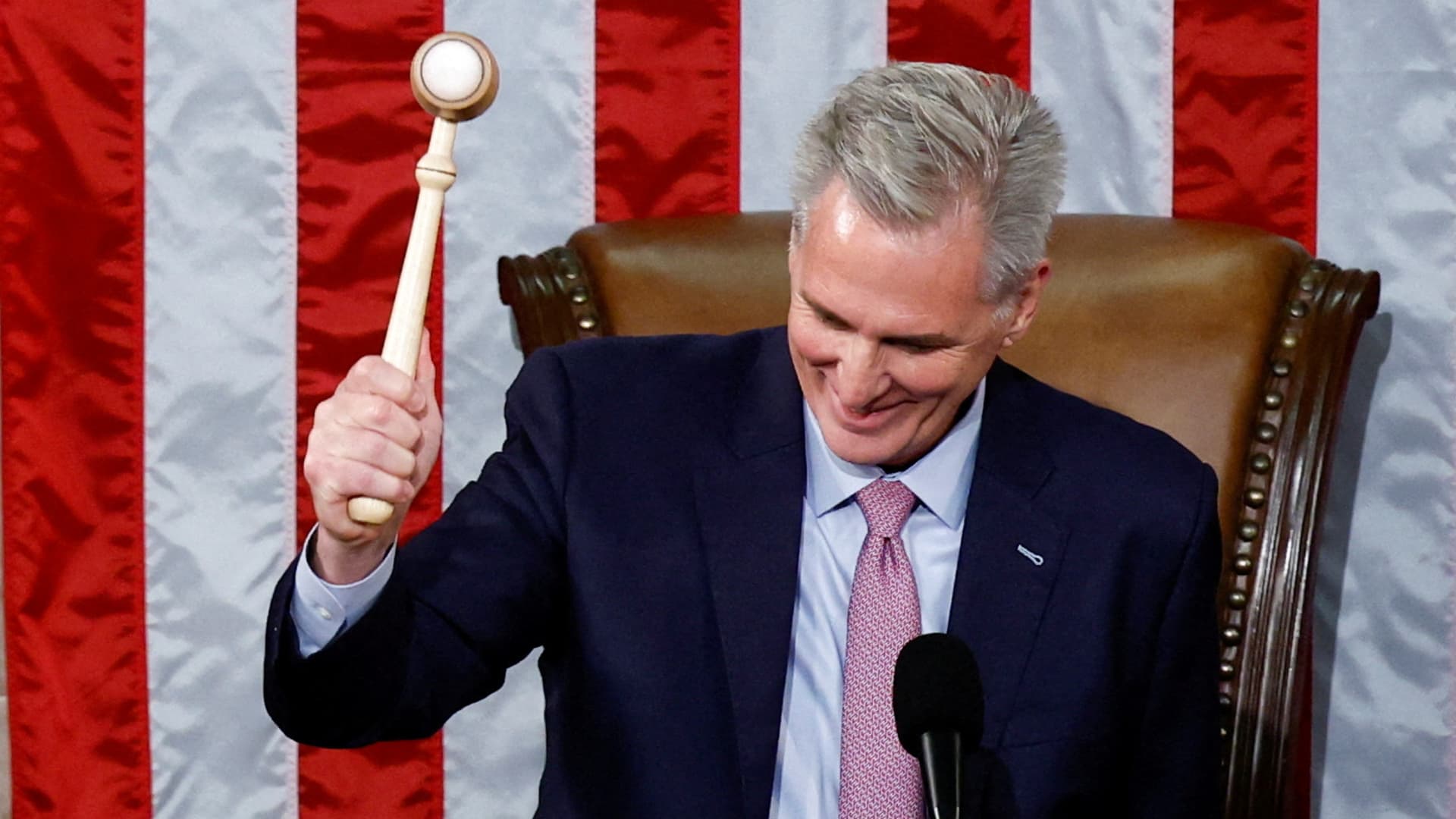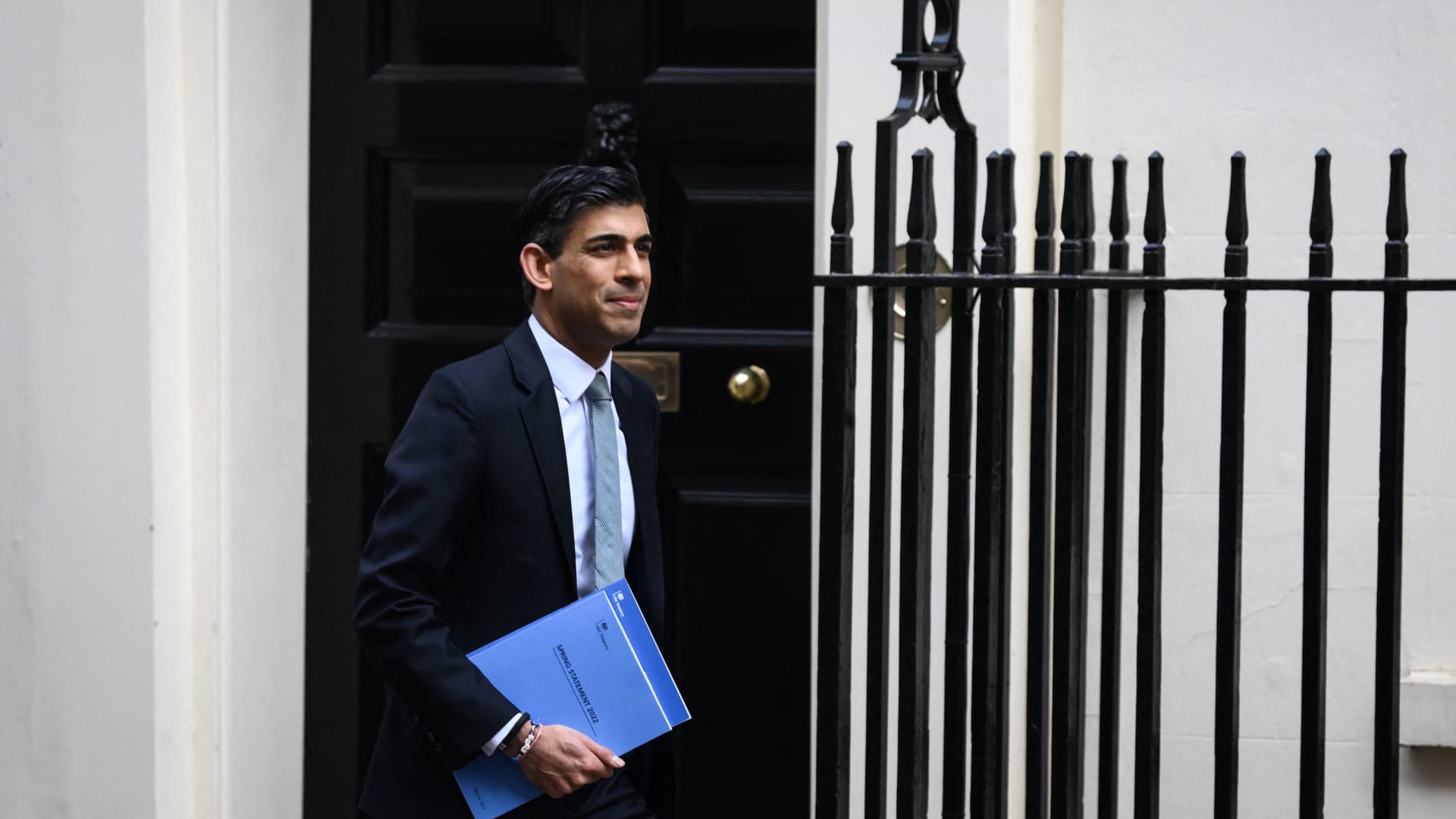Op-ed: Did House Speaker Kevin McCarthy really gain any power?
Many of the 19 Republicans who voted repeatedly against McCarthy really dislike him. It was embarrassing, but this is not about embarrassment.

Speaker of the House Kevin McCarthy (R-CA) bangs the Speaker's gavel for the first time after being elected the next Speaker of the U.S. House of Representatives in a late night 15th round of voting on the fourth day of the 118th Congress at the U.S. Capitol in Washington, U.S., January 7, 2023.
Evelyn Hockstein | Reuters
Heidi Heitkamp is a Democrat who represented North Dakota in the U.S. Senate from 2013 to 2019. She's also a contributor for CNBC.
Last week, after ceding control to the ultra-right wing of his party, Rep. Kevin McCarthy became the 55th Speaker of the U.S. House of Representatives. This happened after the dysfunction and division of the Republican House majority was placed in full view to the American public. Most news coverage has focused on the historical uniqueness of this drama — the personality and sometimes physical conflicts — and the embarrassment to the House Republican Caucus.
Yes, many of the 19 Republicans who voted repeatedly against McCarthy really dislike him. It was embarrassing, but this was not about embarrassment. Never underestimate that the real motivation for holding out was to pursue a strategy which would give 19 ideologically driven, fiscal hardliners, an outsized role in the establishment of fiscal policy in America. Do not look to the boring description of rule changes. Focus instead on the consequences of those rule changes.
McCarthy wanted the power to set the agenda and consequently create coherent, unified messaging for the Republican Caucus in the upcoming 2024 election. The holdouts did not trust him to advance an ultra-right wing agenda within that framework and forced concessions from McCarthy last week that will drive the Republican party hard to the right. Building bridges and consensus on legislation within the Republican caucus will be difficult, let alone with Democrats on the other side of the aisle.
By holding out, these 19 Members have secured an outsized role in fiscal policy that includes a commitment to threaten the debt limit and on voting to cut so-called entitlement programs (Social Security, Medicare, and Medicaid). The U.S. is projected to hit the debt limit in a few months, and it will be up to Republicans in the 118th Congress to step up to avoid the economic stress for American families that will ensue if the U.S. defaults on its bonds.
People near retirement would be out thousands of dollars, jobs would be lost, mortgages and everyday goods would cost more, seniors who depend on Social Security would not receive their benefits on time, along with a number of other issues that would hinder the U.S. economy to function. These hard liners are also talking about massive cuts to military spending. Big picture, if the gamesmanship that played out last week becomes the norm in the House, it could have harrowing consequences for the American people.
By agreeing to their demands, McCarthy has lost control of the Republican message. The dirty little secret is that despite all the rhetoric of Republican fiscal responsibility, the vast majority of the Republican House caucus knows that forcing a vote is very bad politics for most members and could very well be political suicide for the future of the Republican majority. Vote yes and anger a very loyal portion of the Republican base: Americans over the age of 65. Vote no and be labeled a big spending liberal and someone who is not serious about debt and deficit.
Before he even had the speaker's gavel in his hands, McCarthy failed two key tests of congressional leadership. First, by letting hardline messaging set the terms for his speakership, he showed that he cannot manage guiding Republicans through the transition from fire breathing minority with no accountability to a governing majority that has responsibilities. Second, by giving away the store and allowing any member to put his tenure on the line at any time, he has shown that when push comes to shove, he is not strong enough to say "no" when the moment requires it. This sets up a dangerous dynamic for the high-stakes fiscal fights over the horizon.
I can hear it now, "Same old Democratic playbook: scare seniors about Social Security and Medicare. Voters will not believe it." It is not a scare tactic if the Republican policy goal is exactly that. The example of reproductive rights is also relevant here. For years, Democrats tried to get voters to realize that reproductive rights were on the ballot, but it was not until the reversal of Roe v. Wade that the pro-choice majority spoke and voted, seriously damaging their opportunity for a red wave in the 2022 mid-terms. When cutting Social Security and Medicare moves from rhetoric to votes, seniors will take ballot action.
At the same time the fiscal hardliners were negotiating with Kevin McCarthy, a bi-partisan group of senators, including Republican Leader Mitch McConnell, and President Joe Biden were celebrating infrastructure investments on the border between Ohio and Kentucky. All across America, Republicans who did not vote for spending are showing up at "shovel" events celebrating infrastructure investment. Spending might be irresponsible, but it is politically popular.
The demands secured by the 19 from McCarthy are that there will be no vote on raising the debt limit without the opportunity to vote on spending cuts, which also presents a serious threat to the American economy. The U.S. Treasury estimates that the debt limit vote will be needed in August. Reportedly, McCarthy has agreed to not agree to not raise the debt limit without serious spending cuts. Advancing cuts in entitlement programs and domestic spending, will greatly limit Democratic member votes, so once again on the debt limit vote, the 19 members will play an outsized role.
Finally, securing a Republican majority in the House gave the Republican party the opportunity to move beyond Donald Trump as it's leader. There were plenty of reasons to believe that Trump's influence was dwindling in the face of numerous losses. Crediting Trump with McCarthy's victory, as the speaker did, puts Trump front row and center in the Republican party and back at the head of the Republican table. On that measure, credit both those 19 members and Speaker #55.
For political junkies, McCarthy's 15 ballot road to the speakership provided some drama. But that drama leaves us with a dysfunctional house, a looming economic crisis, and a re-empowered Trump. Kevin McCarthy had a bad week, but America's was worse.

 BigThink
BigThink 
































